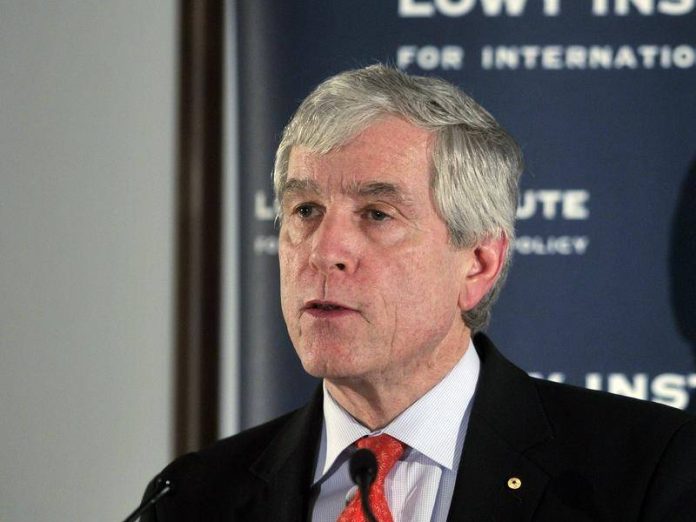The nation’s former spymaster warns Australia has squandered its chances to form meaningful relationships with the Pacific, leaving it looking to the United States to intervene and fix a significant security problem in the region after China struck its security pact with the Solomon Islands.
In an opinion piece for The Australian Financial Review, Nick Warner – who oversaw the start of the Australian-led peacekeeping mission to Solomon Islands known as RAMSI – said it was clear to Canberra by 2015 that Beijing was scouring the South Pacific for a base, with a number of sites in Vanuatu and Papua New Guinea floated.
“Oblivious until that point, we were sleepwalking into a new and dangerous strategic environment: a Chinese naval base or facility in the South Pacific would seriously complicate Australia’s security, depending on its size, nature and location, and require a significant increase in defence spending (well above the current 2 per cent of GDP) and changes to the force structure of the Australian Defence Force,” he said.
“With good and timely information, nimble and well-funded government action, and clever and sensitive diplomacy, none of these and other Chinese hopes for a base came off. But as others have said, this was a game of whack-a-mole. We whacked successfully, but China wasn’t going to give up its ambition for a military base.
“And it was clear that if we slipped up, were too slow, or were less adroit with our diplomacy, we would wake up one morning to the news that China had signed a security agreement with one of our neighbours. And, of course, that is what happened a week or so ago.”
The revelation of the security agreement – and the fear it could lead eventually to a Chinese military base, despite Beijing’s and Honiara’s denials – has dominated the election campaign.
Labor has blamed the Morrison government for “dropping the ball” but the government ministers have insinuated the Solomon Islands government was paid off by Beijing.
Opposition home affairs spokeswoman Kristina Keneally demanded a briefing on Thursday after Home Affairs Minister Karen Andrews said Beijing had timed the agreement to interfere in Australia’s election.
In a speech to the United States Studies Centre on Thursday, Foreign Minister Marise Payne said Australia continued to speak to Pacific Island Forum members about a regional response, adding Australia would always take actions to preserve peace.
“The Solomon Islands’ sovereign decision reflects the geostrategic reality of the time we are now in as China continues to seek a security presence in the Pacific,” she said.
“These are matters we have been dealing with for some time. It’s an issue we as a region and a family are facing, as other parts of the Indo-Pacific are facing it.
“But Australia will always take the necessary, appropriate actions to maintain the peace, security and resilience of our region.”
Solomon Islands has said it will publicly release the agreement, which was negotiated in secrecy, only with Beijing’s permission. China’s foreign ministry continued to obfuscate on that, saying it would act in line with “international customary practice on the basis of bilateral consultation”.
Senator Payne took a shot at that ongoing secrecy. “We’ll continue talking with the Solomon Islands government about how the Pacific family is best placed to provide security assistance in our region,” she said.
“We have done that successfully. We will continue to do that, and no document signed and kept away from public view is going to change that.”
Senator Payne said the government had been at the forefront of addressing the changing geostrategic reality in the Indo-Pacific, including China’s assertiveness.
“There is now strong agreement from amongst the Australian people that standing firm on our values and principles even in the face of pressure is the right approach for our long-term future,” she said.
“Building our strength and working with others to put that strength to good use is our safest course to ensuring that in the coming decades we are free to be ourselves and to exercise our choices.”
Warner, a former head of the Defence Department, the Australian Secret Intelligence Service and the Office of National Intelligence, argued while successive governments had done some good things to engage with the Pacific, it was not enough and the region had been relegated to a bureaucratic backwater.
He said a fundamental reset in relations with the region was required, including the possibility of a political association between Australia and some of the smaller nations. This could be similar to the political compacts the US and New Zealand have, whereby they assume the security responsibilities on behalf of smaller countries.
Warner said the Pacific Step-up had been a good start but should have been the first part of a long journey. He acknowledged Australia had undermined its standing through its stance on climate change.
“Since the end of World War II, Australia has squandered the chance to build deep and enduring relations with our neighbours in the South Pacific. And now it’s almost too late,” Warner said.
“We are looking to the US to intervene and to fix a significant security problem in the South Pacific. The Americans bring power and influence and money. But Solomon Islands is far from Washington and even further from its knowledge base.
“China is now seemingly entrenched in Solomons and will also be looking for other opportunities for a base elsewhere in the Pacific. But, for better or worse, Pacific politics seldom provide certainty. It’s not too late for Australia to shore up its place in the South Pacific and to protect its strategic interests.
“We can continue to wander into this new and more dangerous strategic environment, or we can actually, finally, after a long stupor, do what we should have done decades ago – truly embrace our friends in the South Pacific,” he said.
SOURCE: AFR/PACNEWS













